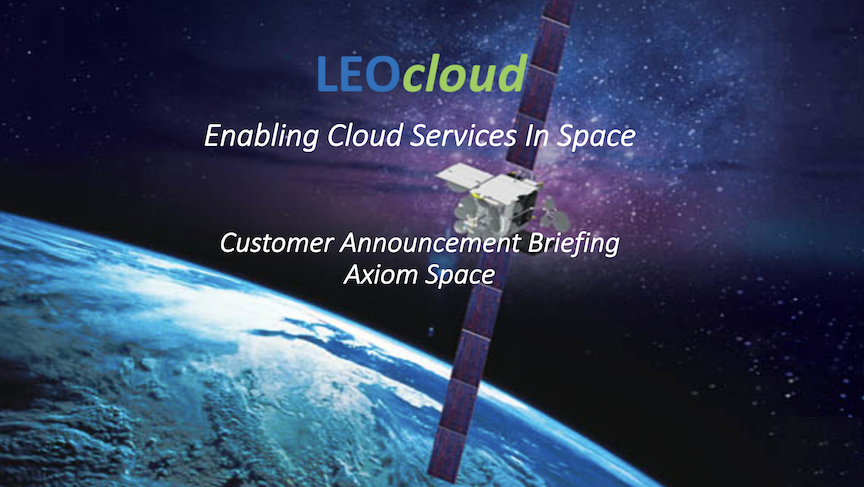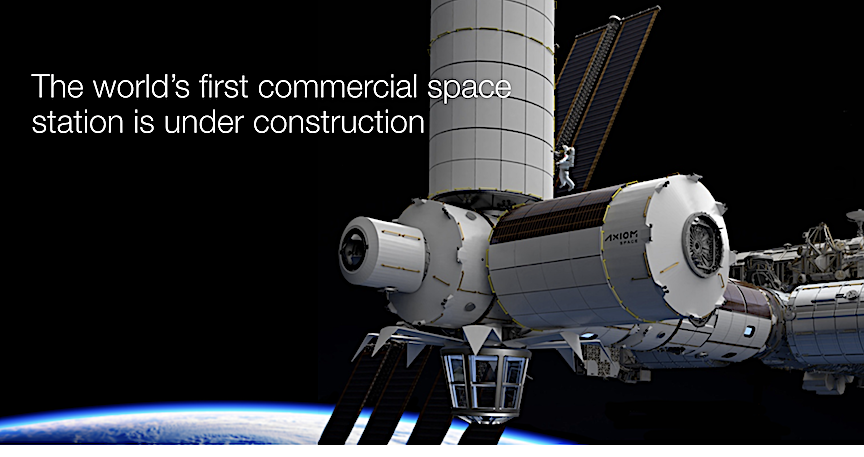
LEOcloud announced they have entered into a Strategic Collaboration Agreement with Axiom Space Inc., the developer of the world’s first commercial space station, for the purpose of developing and delivering space-based cloud services.

LEOcloud’s Space Edge Infrastructure as a Service (IaaS) will enable scalable, resilient, reliable Space-hardened cloud edge computing services that are a seamless extension of today’s terrestrial cloud services. Space Edge IaaS multi-cloud service will be part of the critical infrastructure that is evolving in Space where data can be sourced from anywhere in Space and on Earth to be processed by workloads hosted in Space. LEOcloud Space Edge IaaS includes support for Red Hat OpenShift, the industry’s leading enterprise Kubernetes platform, to enable cloud services across hybrid cloud and at the edge with greater speed, flexibility and consistency.
Infrastructure as a Service (IaaS) will enable scalable, resilient, reliable Space-hardened cloud edge computing services that are a seamless extension of today’s terrestrial cloud services. Space Edge IaaS multi-cloud service will be part of the critical infrastructure that is evolving in Space where data can be sourced from anywhere in Space and on Earth to be processed by workloads hosted in Space. LEOcloud Space Edge IaaS includes support for Red Hat OpenShift, the industry’s leading enterprise Kubernetes platform, to enable cloud services across hybrid cloud and at the edge with greater speed, flexibility and consistency.
Space Edge IaaS is extensible from LEO to the lunar region and beyond, bringing the benefits of edge computing as close as possible to the sources and users of data. End users can operate their services or application workloads in a local hybrid cloud environment just as they would on Earth.
LEOcloud’s Space Edge IaaS is based on Ramon.Space compute and data storage technology that is Space-hardened and scalable for the Size, Weight and Power (SWAP) constraints of a satellite to the relatively large SWAP available on Space stations.

Microsoft and LEOcloud’s joint strategic vision is to extend cloud services into space where the combination of Azure Space hosted on LEOcloud’s IaaS will enable end users to run workloads in space-based hybrid cloud regions. For example, local Azure services on a space station will support researchers in space in effectively and efficiently advancing AI and ML insights on-orbit as well as collaborating with their colleagues on Earth. Our mutual customers will be able to realize these benefits in LEO, the cislunar region and beyond.
“Our collaboration combines the possibilities of space with the power of Microsoft Azure extending its capabilities anywhere in the universe through new space infrastructure making cloud connectivity and compute increasingly attainable for all at the ultimate edge—on-orbit in space,” said Steve Kitay, Senior Director of Azure Space at Microsoft. “Together, Microsoft and LEOcloud can unlock brand new edge and cloud computing scenarios equipping organizations around the globe with fresh insights from space data to drive innovative solutions to their most complex and time-consuming questions.”
“Red Hat is excited to be working with LEOcloud in this latest collaboration to deliver open hybrid cloud computing to the next frontier with edge computing. Hosted on LEOcloud’s Space Edge IaaS, Red Hat open source technologies provide a common foundation from core to edge to cloud to deliver a reliable and secure infrastructure for mission critical, high-stakes environments like Space,” said Francis Chow, vice president and general manager, In-Vehicle Operating System and Edge, Red Hat.
“LEOcloud is proud to be delivering Space Edge IaaS to Axiom Space to meet the anticipated demand of their customers,” said Dennis R. Gatens, CEO and founder of LEOcloud. “Space is the next domain for cloud edge computing where it will be part of the rapidly evolving critical infrastructure.”
